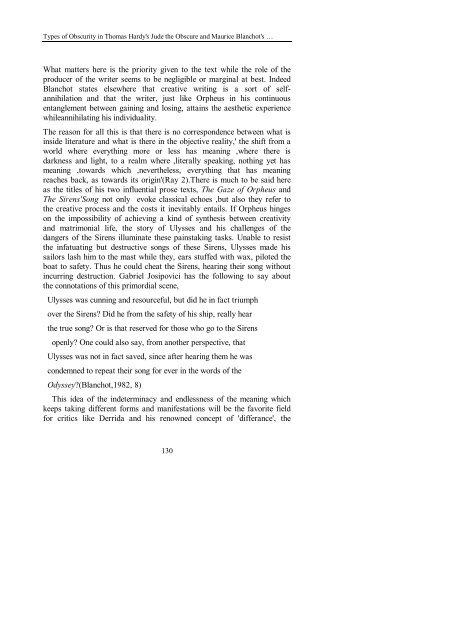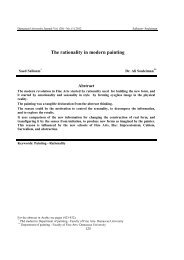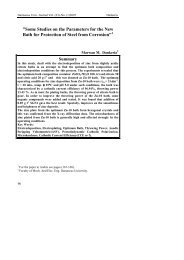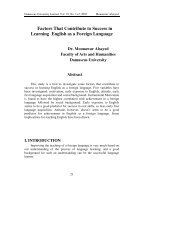Types of Obscurity in Thomas Hardy's Jude the Obscure and ...
Types of Obscurity in Thomas Hardy's Jude the Obscure and ...
Types of Obscurity in Thomas Hardy's Jude the Obscure and ...
Create successful ePaper yourself
Turn your PDF publications into a flip-book with our unique Google optimized e-Paper software.
<strong>Types</strong> <strong>of</strong> <strong>Obscurity</strong> <strong>in</strong> <strong>Thomas</strong> <strong>Hardy's</strong> <strong>Jude</strong> <strong>the</strong> <strong>Obscure</strong> <strong>and</strong> Maurice Blanchot's …What matters here is <strong>the</strong> priority given to <strong>the</strong> text while <strong>the</strong> role <strong>of</strong> <strong>the</strong>producer <strong>of</strong> <strong>the</strong> writer seems to be negligible or marg<strong>in</strong>al at best. IndeedBlanchot states elsewhere that creative writ<strong>in</strong>g is a sort <strong>of</strong> selfannihilation<strong>and</strong> that <strong>the</strong> writer, just like Orpheus <strong>in</strong> his cont<strong>in</strong>uousentanglement between ga<strong>in</strong><strong>in</strong>g <strong>and</strong> los<strong>in</strong>g, atta<strong>in</strong>s <strong>the</strong> aes<strong>the</strong>tic experiencewhileannihilat<strong>in</strong>g his <strong>in</strong>dividuality.The reason for all this is that <strong>the</strong>re is no correspondence between what is<strong>in</strong>side literature <strong>and</strong> what is <strong>the</strong>re <strong>in</strong> <strong>the</strong> objective reality,' <strong>the</strong> shift from aworld where everyth<strong>in</strong>g more or less has mean<strong>in</strong>g ,where <strong>the</strong>re isdarkness <strong>and</strong> light, to a realm where ,literally speak<strong>in</strong>g, noth<strong>in</strong>g yet hasmean<strong>in</strong>g ,towards which ,never<strong>the</strong>less, everyth<strong>in</strong>g that has mean<strong>in</strong>greaches back, as towards its orig<strong>in</strong>'(Ray 2).There is much to be said hereas <strong>the</strong> titles <strong>of</strong> his two <strong>in</strong>fluential prose texts, The Gaze <strong>of</strong> Orpheus <strong>and</strong>The Sirens'Song not only evoke classical echoes ,but also <strong>the</strong>y refer to<strong>the</strong> creative process <strong>and</strong> <strong>the</strong> costs it <strong>in</strong>evitably entails. If Orpheus h<strong>in</strong>geson <strong>the</strong> impossibility <strong>of</strong> achiev<strong>in</strong>g a k<strong>in</strong>d <strong>of</strong> syn<strong>the</strong>sis between creativity<strong>and</strong> matrimonial life, <strong>the</strong> story <strong>of</strong> Ulysses <strong>and</strong> his challenges <strong>of</strong> <strong>the</strong>dangers <strong>of</strong> <strong>the</strong> Sirens illum<strong>in</strong>ate <strong>the</strong>se pa<strong>in</strong>stak<strong>in</strong>g tasks. Unable to resist<strong>the</strong> <strong>in</strong>fatuat<strong>in</strong>g but destructive songs <strong>of</strong> <strong>the</strong>se Sirens, Ulysses made hissailors lash him to <strong>the</strong> mast while <strong>the</strong>y, ears stuffed with wax, piloted <strong>the</strong>boat to safety. Thus he could cheat <strong>the</strong> Sirens, hear<strong>in</strong>g <strong>the</strong>ir song without<strong>in</strong>curr<strong>in</strong>g destruction. Gabriel Josipovici has <strong>the</strong> follow<strong>in</strong>g to say about<strong>the</strong> connotations <strong>of</strong> this primordial scene,Ulysses was cunn<strong>in</strong>g <strong>and</strong> resourceful, but did he <strong>in</strong> fact triumphover <strong>the</strong> Sirens? Did he from <strong>the</strong> safety <strong>of</strong> his ship, really hear<strong>the</strong> true song? Or is that reserved for those who go to <strong>the</strong> Sirensopenly? One could also say, from ano<strong>the</strong>r perspective, thatUlysses was not <strong>in</strong> fact saved, s<strong>in</strong>ce after hear<strong>in</strong>g <strong>the</strong>m he wascondemned to repeat <strong>the</strong>ir song for ever <strong>in</strong> <strong>the</strong> words <strong>of</strong> <strong>the</strong>Odyssey?(Blanchot,1982, 8)This idea <strong>of</strong> <strong>the</strong> <strong>in</strong>determ<strong>in</strong>acy <strong>and</strong> endlessness <strong>of</strong> <strong>the</strong> mean<strong>in</strong>g whichkeeps tak<strong>in</strong>g different forms <strong>and</strong> manifestations will be <strong>the</strong> favorite fieldfor critics like Derrida <strong>and</strong> his renowned concept <strong>of</strong> 'differance', <strong>the</strong>130
















